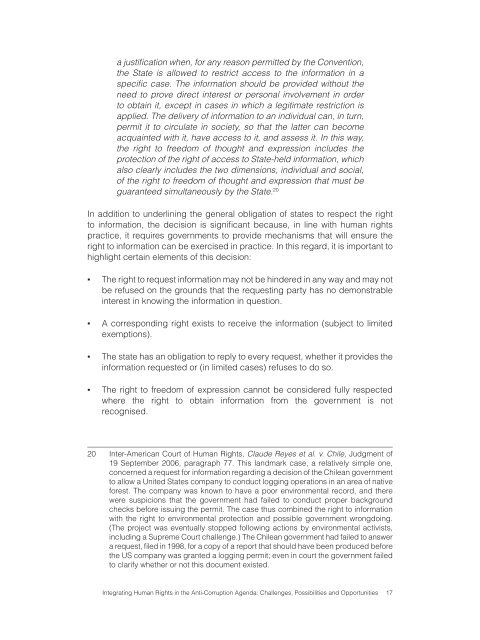Integrating Human Rights in the Anti-Corruption Agenda - The ICHRP
Integrating Human Rights in the Anti-Corruption Agenda - The ICHRP
Integrating Human Rights in the Anti-Corruption Agenda - The ICHRP
You also want an ePaper? Increase the reach of your titles
YUMPU automatically turns print PDFs into web optimized ePapers that Google loves.
a justification when, for any reason permitted by <strong>the</strong> Convention,<br />
<strong>the</strong> State is allowed to restrict access to <strong>the</strong> <strong>in</strong>formation <strong>in</strong> a<br />
specific case. <strong>The</strong> <strong>in</strong>formation should be provided without <strong>the</strong><br />
need to prove direct <strong>in</strong>terest or personal <strong>in</strong>volvement <strong>in</strong> order<br />
to obta<strong>in</strong> it, except <strong>in</strong> cases <strong>in</strong> which a legitimate restriction is<br />
applied. <strong>The</strong> delivery of <strong>in</strong>formation to an <strong>in</strong>dividual can, <strong>in</strong> turn,<br />
permit it to circulate <strong>in</strong> society, so that <strong>the</strong> latter can become<br />
acqua<strong>in</strong>ted with it, have access to it, and assess it. In this way,<br />
<strong>the</strong> right to freedom of thought and expression <strong>in</strong>cludes <strong>the</strong><br />
protection of <strong>the</strong> right of access to State-held <strong>in</strong>formation, which<br />
also clearly <strong>in</strong>cludes <strong>the</strong> two dimensions, <strong>in</strong>dividual and social,<br />
of <strong>the</strong> right to freedom of thought and expression that must be<br />
guaranteed simultaneously by <strong>the</strong> State. 20<br />
In addition to underl<strong>in</strong><strong>in</strong>g <strong>the</strong> general obligation of states to respect <strong>the</strong> right<br />
to <strong>in</strong>formation, <strong>the</strong> decision is significant because, <strong>in</strong> l<strong>in</strong>e with human rights<br />
practice, it requires governments to provide mechanisms that will ensure <strong>the</strong><br />
right to <strong>in</strong>formation can be exercised <strong>in</strong> practice. In this regard, it is important to<br />
highlight certa<strong>in</strong> elements of this decision:<br />
▪<br />
▪<br />
▪<br />
▪<br />
<strong>The</strong> right to request <strong>in</strong>formation may not be h<strong>in</strong>dered <strong>in</strong> any way and may not<br />
be refused on <strong>the</strong> grounds that <strong>the</strong> request<strong>in</strong>g party has no demonstrable<br />
<strong>in</strong>terest <strong>in</strong> know<strong>in</strong>g <strong>the</strong> <strong>in</strong>formation <strong>in</strong> question.<br />
A correspond<strong>in</strong>g right exists to receive <strong>the</strong> <strong>in</strong>formation (subject to limited<br />
exemptions).<br />
<strong>The</strong> state has an obligation to reply to every request, whe<strong>the</strong>r it provides <strong>the</strong><br />
<strong>in</strong>formation requested or (<strong>in</strong> limited cases) refuses to do so.<br />
<strong>The</strong> right to freedom of expression cannot be considered fully respected<br />
where <strong>the</strong> right to obta<strong>in</strong> <strong>in</strong>formation from <strong>the</strong> government is not<br />
recognised.<br />
20 Inter-American Court of <strong>Human</strong> <strong>Rights</strong>, Claude Reyes et al. v. Chile, Judgment of<br />
19 September 2006, paragraph 77. This landmark case, a relatively simple one,<br />
concerned a request for <strong>in</strong>formation regard<strong>in</strong>g a decision of <strong>the</strong> Chilean government<br />
to allow a United States company to conduct logg<strong>in</strong>g operations <strong>in</strong> an area of native<br />
forest. <strong>The</strong> company was known to have a poor environmental record, and <strong>the</strong>re<br />
were suspicions that <strong>the</strong> government had failed to conduct proper background<br />
checks before issu<strong>in</strong>g <strong>the</strong> permit. <strong>The</strong> case thus comb<strong>in</strong>ed <strong>the</strong> right to <strong>in</strong>formation<br />
with <strong>the</strong> right to environmental protection and possible government wrongdo<strong>in</strong>g.<br />
(<strong>The</strong> project was eventually stopped follow<strong>in</strong>g actions by environmental activists,<br />
<strong>in</strong>clud<strong>in</strong>g a Supreme Court challenge.) <strong>The</strong> Chilean government had failed to answer<br />
a request, filed <strong>in</strong> 1998, for a copy of a report that should have been produced before<br />
<strong>the</strong> US company was granted a logg<strong>in</strong>g permit; even <strong>in</strong> court <strong>the</strong> government failed<br />
to clarify whe<strong>the</strong>r or not this document existed.<br />
<strong>Integrat<strong>in</strong>g</strong> <strong>Human</strong> <strong>Rights</strong> <strong>in</strong> <strong>the</strong> <strong>Anti</strong>-<strong>Corruption</strong> <strong>Agenda</strong>: Challenges, Possibilities and Opportunities 17

















